#people criticizing the live action for all the wrong reasons
Text
Once More For the People in the Back:
- Lilo & Stitch is NOT about the evils of colonization.
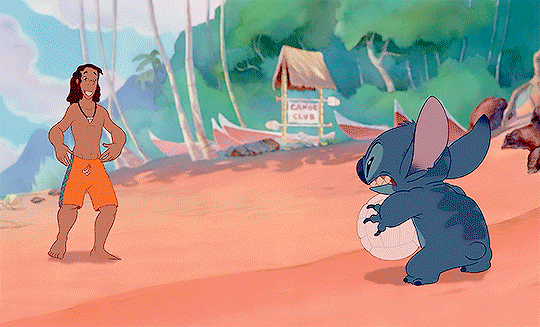
It’s about a literal alien monster with no home coming to a planet and town where he doesn’t belong and being adopted as one of their own. Even after he destroys everything they love and build. Spin that into a metaphor for how terrible colonization is, if you can.
- Lilo & Stitch is NOT about the hardships people with dark skin inherently face.

It is about the hardships of people who lose family members and have to adjust to loving someone new. Nani is struggling to keep Lilo because she’s an 18 year-old orphan trying to play mom to a little sister who just needs someone to be her friend. She’s losing job opportunities because Lilo is trying to accept a destructive monster into their family with destructive results, not because she has dark skin.
- Lilo & Stitch is NOT about the evils of racism.
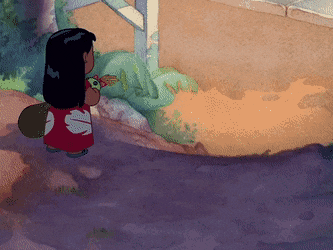
Lilo & Stitch is about an alien learning the meaning of family. Lilo explicitly demonstrates a hatred of tourists (not white people, just tourists, because Cobra Bubbles is implied to be a tourist in the same scene.) in one scene and that scene was deleted because it took the focus away from other scenes which made the point of the film more clearly. If a bad light is put on tourism, it’s to emphasize that Lilo has a problem with people leaving—”I remember everyone that leaves; I need someone who won’t run away; You came back; nobody gets left behind.”
And finally, drumroll please:
-Lilo and Stitch is NOT about celebrating diversity.

Celebrating diversity is a fine message. It’s just not the one Lilo & Stitch is delivering. You’re thinking of Ice Age 4, where all kinds of animals make up a family; or Zootopia, where all all kinds of people can perform different jobs in society.
No. Lilo & Stitch is about what family means, and that is: unconditional love. Loving you at your worst and helping you to be better.
The fact that the social worker is black, or male, has nothing to do with that main point. The fact that the Grand Councilwoman is female has nothing to do with the main point. The fact that one alien is skinny and one is fat has nothing to do with the main point. The fact that Nani and Lilo have dark skin has nothing to do with the main point—just like the fact that Stitch is blue has nothing to do with the main point.
Those factors might help in a peripheral way—(blue is the color the human brain associates with supernatural creatures; dark skin = Hawaiian = believably being brought up on the philosophy of ‘Ohana) —but you could still change any one of those things and it would remain Lilo & Stitch.
By contrast, with a film that is actually about celebrating diversity like Ice Age 4, if you change the hedgehog into another mammoth you lose the point of the story. Or in Zootopia, if you make Judy and Nick both bunnies you lose the point of the story. Diversity is a fine point. Whatever. But it’s not the point of Lilo & Stitch.

FORGET what you are hearing on Twitter in relation to the Live Action Movie. You can say what you want about how much you wish a certain shade of skin were representing the characters you love.
But if, to make your point, you try to argue that the original had ANYTHING to do with specific shades of color, demonstrating colonization and racism evils, or representing the hardships of POCs trying to get a job, you are being disingenuous. Or worse, you’re just tossing the real point of the movie carelessly over one shoulder so you can wedge a cause that it was never championing in where it doesn’t fit.
Try and make your point about how skin color and representation matters all you want, but you can’t honestly do it using the example the original movie set. The point of the original movie is just bigger and better than “skin colors should be given more attention.”
#people criticizing the live action for all the wrong reasons#it deserves criticism just for existing#but not because of the colors of the actor’s skins#because that was never a crucial point in the first movie#lilo and stitch#live action#disney live action#disney live action remake#stitch#lilo#david#nani#pleakley#jumba#live action Lilo and stitch#lilo and stitch remake#colorism#racism#diversity#representation#Lilo and stitch fandom#L&S#Disney discourse#film analysis#writing#Lilo and stitch analysis
52 notes
·
View notes
Text
man the live action monster high movie has its problems but why are people acting like frankie being nonbinary now is one of them. why dont you get mad over literally anything else about the movie thats actually an issue instead of shitting your pants over a fictional character from a childrens movie saying their pronouns are they/them
#and the way most if not all of the criticism ive seen for nonbinary frankie has just been#people misgendering them on purpose and making stuff up about how their gender is handled in the movie#i feel like this is just transphobia i cant think of a reason that actually makes sense for people to be mad over this#when will people be normal about nonbinary characters i Cannot take this shit anymore#and im worried people are gonna take this the wrong way so once again saying that#im not defending the live action monster high movie or saying theres nothing wrong with it at all it Does have its issues.#im just saying that nonbinary frankie is not one of them nonbinary frankie is lliterally harmless calm the hell down#ALSO WHEN I TALK ABOUT PROBLEMS WITH THE MOVIE im talking about acutal moral issues.#not harmless changes to the characters being made
28 notes
·
View notes
Text
Is your pro-Palestine activism hurting innocent people? Here's how to avoid that.
Note: If you prefer plain text, you can read the plain text version here.
Over the last few days, I’ve had conversations with several Jewish people who told me how hurt and scared they are right now.
To my great regret, some of that pain came from a poorly-thought-out post of mine, which – while not ill-intentioned – WAS hurtful.
And a lot of it came from cruelty they’d experienced at the hands of people who claim to be advocating for Palestine, but are using the very real plight of innocent Palestinians to harm equally innocent Jewish people.
Y’all, we need to do better. (Yes, “we” definitely includes me; this is in no small part a “learn from my fail” post, and also a “making amends” post. Some of these are mistakes I’ve made in the past.)
So if you’re an advocate for Palestine who wants to make sure that your defense of one group of vulnerable people doesn’t harm another, here are some important things to do or keep in mind:
Ask yourself if you’re applying a standard to one group that you aren’t applying to another.
Would you want all white Americans or Canadians to be expelled from America or Canada?
Do you want all Jewish people to be expelled from Israel, as opposed to finding a way to live alongside Palestinian Arabs in peace?
If the answer to those two questions is different, ask yourself WHY.
Do you want to be held responsible for the actions of your nation’s army or government? No? Then don’t hold innocent Jewish people, or Israelis in general (whether Jewish or otherwise), responsible for the actions of the Israeli army and government.
On that subject, be wary of condemning all Israeli people for the actions of the IDF. Large-scale tactical decisions are made by the top brass. Service is compulsory, and very few can reasonably get out of service.
Blaming all Israelis for the military’s actions is like blaming all Vietnam vets for the horrors in Vietnam. They’re not calling the shots. They aren’t Nazis running concentration camps. They are carrying out military operations that SHOULD be criticized.
And do not compare them or ANY JEWISH PERSON to Nazis in general. It is Jewish cultural trauma and not outsiders’ to use against them.
Don’t infuse legitimate criticism with antisemitism.
By all means, spread the word about the crimes committed by the Israeli army and government, and the complicity of their allies. Criticize the people responsible for committing and enabling atrocities.
But if you imply that they’re committing those crimes because they’re Jewish, or because Jewish people have special privileges, then you’re straying into antisemitic territory.
Criticize the crime, not the group. If you believe that collective punishment is wrong, don’t do it yourself.
And do your best to use words that apply directly to the situation, rather than the historical terms for situations with similar features. For example, use “segregation,” “oppression,” or “subjugation,” not “Holocaust” or “Jim Crow.” These other historical events are not the cultural property of Jews OR Palestinians, but also have their own nuances and struggles and historical contexts.
Also, blaming other world events on Jewish people or making Jewish people associated with them (for instance, some people falsely blame Jewish people for the African slave trade) is a key feature of how antisemitism functions.
Please, by all means, be specific and detailed in your critiques. But keep them focused on the current political actors – not other peoples’ or nations’ political or cultural histories and traumas.
Be prepared to accept criticism.
You probably already know that society is infused with a wide array of bigotries, and that people growing up in that environment tend to absorb those beliefs without even realizing it. Antisemitism is no exception.
What that means is, there’s a very real chance that you will screw up, and get called out on it, as I so recently did.
If that happens, please be willing to learn and adapt. If you can educate yourself about the suffering and needs of Palestinians, you can do the same for Jewish people.
Understand that the people you hurt aren’t obligated to baby you. Give them room to be angry.
After I made a post that inadvertently hurt people, some were nice about it, and others weren’t. Some outright insulted my morals and intelligence.
And I had to accept that I’d earned that from them.
I’d hurt them, and they weren’t obligated to be more careful with my feelings than I had been with theirs.
They weren’t obligated to forgive me, trust me, or stop being mad at me right away.
I’ll admit, there were moments when I got defensive. I shouldn’t have. And I encourage you to try not to, if you screw up and hurt people.
I know that’s hard, but it’s important. Getting defensive only tells people you care more about doubling down on your mistake than you do about healing the hurt it caused.
Instead, acknowledge that they have a right to be angry, apologize for the way you hurt them, and try to make amends, while understanding that they don’t owe you trust or forgiveness.
Be aware that some antisemites are using legitimate complaints to “Trojan horse” antisemitism into leftist spaces.
This is a really easy stumbling block to trip over, because most people probably don’t look at every post a creator makes before sharing the one they’re looking at right now.
I recently shared a video that called out some of the Likud and IDF’s atrocities and hypocrisy, and that also noted that many Jewish people are wonderful members of their communities.
I was later informed that, while that video in particular seemed reasonable, the creator behind it is frequently antisemitic.
I deleted the post, and blocked the creator. I encourage you to do the same if it’s brought to your attention that you’ve been ‘Trojan horse’d.
EDIT: Important note about antisemitism in leftist spaces:
While it's true that some blatant antisemites are using seemingly reasonable posts to get their foot in the door of leftist spaces, it's also true that a lot of antisemitism already exists inside those spaces.
This antisemitism is often dressed up in progressive-sounding language, but nonetheless singles Jewish people and places out in ways that aren't applied equally to other groups, or that label Jewish people in ways that portray them as acceptable targets.
If you want to see some specific examples, so you can have a better idea of what to keep an eye out for, I suggest reading this excellent reblog of this post.
Fact-check your doubts about antisemitism.
Depending on which parts of the internet you look at, you’ve probably seen people accused of antisemitism because they complained about the Likud and/or IDF’s actions. So you might be primed to be wary, or feel unsure of how to tell what counts as real antisemitism.
But that doesn’t mean antisemitism isn’t a very real, widespread, and harmful problem. And it doesn’t mean many or even most Jewish people are lying to you or being overly sensitive.
So if someone says something is antisemitic, and you aren’t sure, I encourage you to:
A. Look up the action or thing in question, including its history. Is there an antisemitic history or connotation you aren’t aware of? For best results, include “antisemitic” in your search query, in quotes.
B. Understand that some things, while not inherently antisemitic, have been used by antisemites often enough that Jewish people are understandably wary of them. Schrodinger’s antisemitism, if you will.
C. Ask Jewish people WHO HAVE OFFERED TO HELP EDUCATE YOU. Emphasis on WHO HAVE OFFERED. Random Jewish people aren’t obligated to give you their time and emotional energy, or to educate you – especially on subjects that are scary or painful for them.
@edenfenixblogs has kindly offered her inbox to those who are genuinely trying to learn and do better, and I’ve found her to be very kind, patient, reasonable, and fair-minded.
Understand that this is URGENTLY NEEDED.
In one of my conversations with a Jewish person who’d called me out, they said this was the most productive conversation they’d had with a person with a Palestinian flag in their profile.
THIS IS NOT OKAY.
I didn’t do anything special. All I did was listen, apologize for my mistakes, and learn.
Yes, it feels good to be acknowledged. But I feel like I’ve been praised for peeing IN the toilet, instead of beside it.
Apologizing, learning, and making amends after you hurt people shouldn’t be “the most reasonable thing I’ve heard from a person with a Palestinian flag pfp.”
It should be BASIC DECENCY.
And the fact that it’s apparently so uncommon should tell you how much unnecessary stress and fear Jewish people have been living with because of people who consider themselves defenders of human rights.
By all means, be angry at the Likud, the IDF, and the politicians, reporters, and specific media outlets who choose to enable and cover up for them.
But direct that anger toward the people who deserve it and are in a position to do something about it, not random people who simply happen to be Jewish, or who don’t want millions of people to be turned into refugees when less violent methods of achieving freedom and rights for Palestinians are available.
Stop peeing beside the toilet, people.
#I/P#I/P conflict#I/P war#Israel#Palestine#Gaza#free Palestine#Israel Palestine conflict#Israel Palestine war#Jewish goyim solidarity#choose peace
3K notes
·
View notes
Text
Absolutely reeling.
So I knew that the origin of "Hector was a great man, moral, noble, better than all of the Greeks" began as Roman propaganda that somehow has made it to now, the year 2023, and is still taught to high school students.
What I did not know was why scholars shit on Achilles as vehemently as they did (and still do).
My copy of Fagles' translation of the Iliad has a preface by a different scholar who I'm not going to bother to name because he's an idiot (and idk probably dead at this point). I read the entire thing, absolutely baffled, because he would cite a part of the text (that I admittedly had not read yet! at all!), quote it, and then come to the most batshit interpretation based on that quote I had ever seen in my life. His general take was that Achilles was a sociopath who had no feelings for anyone other than himself and his own pride, and every action he took (until welcoming Priam into his hut) was done in service of that pride. To support this, he decided that Achilles did not see Patroclus as a person, but rather as an extension of himself, and thus someone injuring Patroclus was them injuring Achilles, and so he did not care about Patroclus, he only cared about his wounded pride.
Yeah.
That sounded wrong before reading the book, and while reading the book all i could think was, "Did we read the same fucking thing???" Put in context, those quotations still did not support his conclusions whatsoever.
But i cracked open Caroline Alexander's "The War That Killed Achilles" last night, and she solves this mystery of "Hector good, Achilles bad" for me right out the gate (which is good because so far I've only read the preface).
Western Europeans by and large learned about the Trojan war from Roman stories, which became fairly popular, and not the Iliad, which was not translated into French or English until centuries later. As mentioned, these were propaganda that cast the Trojans in a much better light than the Greeks because the Romans believed they were descended from Trojan refugees. This starts a trend that is still going on in scholarly circles as casting the Iliad as a war between "barbaric Greeks living in a shitty, lawless camp" vs "civilized, educated, weaving, real-wife-having Trojans," making the Iliad a tragedy in which Homer for some reason skewers his own people and their warlike culture as barbaric while propping up a dead, foreign city-state. This interpretation is still extant and was the postscript to another copy of the Iliad I have.
According to Alexander, scholars closer to Homer's time saw the entire war as a tragedy--both the destruction of Troy AND the destruction of the Greek army. While this is not covered in the Iliad, very few Greeks actually made it home after Troy. Some that did were then outcast (Teucer for example), some were murdered (bye, Agamemnon), some went on to create new kingdoms in other places (Diomedes), but by and large, there was no going home from that war. There was no great victory with all their loot. The entire thing was a disaster for both sides, spurred on by fickle gods.
Back to the more recent European interpretations of this story, one reason Hector ended up cast in such a "good" light, despite being a dumbass who wants to dishonor dead people just as badly as Achilles ever did, was in order to make Achilles look worse. Why was it important that Achilles becomes a villain in this story in which he is very much not a villain? Because Europeans were involved in so much war with each other and the rest of the world that a young, insubordinate man who criticizes his idiot of a commander, decides his life isn't worth throwing away for this war, and refuses to fight to sack a city was an affront to their values. Young men were to be obedient, follow their commanding officers, and colonize the world for queen and country. Achilles suggesting losing his life is not worth it to prop up Agamemnon's war is a dangerous precedent for all the good little soldiers needed to make their nations wealthy.
It's almost funny that these analyses propping up Troy as a beacon of civilization were made by people living in countries so bent on colonizing the world. They identified with the city being sacked and not the greedy sackers of said city, who they were much closer to. And Achilles, educated, morally rigid, emotional Achilles, is recast as a sociopathic asshole who doesn't care about anyone other than himself, unlike all of those other beacons of selflessness among the Greek leadership.
The tragedy of the Iliad is that Achilles is right, the war is pointless, Agamemnon did dishonor the shit out of him, and it doesn't matter because he's going to die in it anyway.
Frankly, given how badly his character has been interpreted for so long, I think the muses owe him an apology.
#the iliad#achilles#I have only read the preface of this book#hope yall like essays#writing essays at 6am and hoping they are grammatical#haven't even had my coffee yet my head is too full of achilles#also a hefty chunk of it was FRENCH propaganda like come ON
2K notes
·
View notes
Text
i posted this on twitter also but it’s still eating at me. i’m so fucking embarrassed to be jewish rn. i dont want to be associated with this ongoing bullshit from israel. why do we need our own state. theyre just making every jew across the globe look bad in general even though many of us are conflicted about zionism and the legitimacy of israel as a state
people have hated jews throughout history for no fuckin reason but now israel exists but now its like. GIVING people reasons to hate us as a group. note that i DON’T conflate zionism with jewishness, but a lot of people in the world don’t know the difference because theyre uninformed and been dripfed cultural antisemitic tropes their whole life and that’s the scary part is them falsely putting two and two together. like what the fuck israel stop youre just putting fuel on the fire for people around the world to hate an entire group of historically persecuted people if youre being this shitty with your insane colonialism and apartheid like……I Want No Fuckin Part Of This. you’re spelling our own doom. you cant just swoop in and go “mine now” and then oppress the people you took land from under a regime without my blood boiling at the injustice no matter WHO you are. even if my lineage is tied to you. so when news outlets support israel it doesn’t feel like they have the best interest of jews as a people in mind. it’s in the interest of a zionist ethnostate and whatever that christian zionism belief is about the jewish people returning to the holy land as prerequisite for the second coming of jesus. its not like they care about us as a dispersed ethnocultural group, it’s all for that religious narrative that a bunch of people in the US are backing.
saying you want all jews to die is antisemitic. beating someone up because they’re jewish and no other reason without knowing their views is antisemitic. criticizing human rights violations perpetrated by israel and the belief that one group deserves more rights another is not antisemitic. and the fact that israel has the ability to pull that antisemitism card in response to criticisms of the violations they commit because their state is the “jewish homeland” drives me fucking insane. take fucking accountability for your actions. and yes, there do exist full-on anti-jewish groups in the middle east that go beyond hatred of israel’s policies and existence as a state and i’m tired of people pretending there aren’t in fear of appearing to seem like they support the state of israel. on the other side of things many people overestimate this by fearmongering and saying EVERY arab is out to get jews worldwide, telling people like me “they want YOU dead”. this is not the belief every person in the middle east and it really rubs me the wrong way that people group millions of individuals into all-encompassing lumps like this. many people there do understand nuance of this political situation.
even if i have that “right of return” by israeli law or whatever, i don’t feel obliged to it; it does not register as fair. why do i have a “right of return” when i’ve never even been there in the first place while palestinians who have homes there can’t return to them? what’s the basis for that? substituting objective reality with an imaginary reality? i don’t think like that. i can hypothetically come and go whenever i please but palestinians are severely limited in mobility? what makes me more entitled to that land than the people who lived there for centuries? nothing that comes from natural law thats for sure. it’s all artificial and inflated.
but at the same time i also dont want to be the target of antisemitism and caught in the fray just for being ethnically jewish. once people start calling for the genocide of entire groups we’ve got issues (and you better believe this absolutely applies to the palestinian victims in gaza too), because people who dissent to the violence perpetrated by the loudest are caught in there with the people who are perpetrating the violence. lack of nuance. people conflating israel and its zionist apartheid policies with jewish ethnicity and culture worldwide. other people conflating being terrorist anti-jew with muslims worldwide (like that 6-year old palestinian-american boy that was just stabbed to death in chicago). scary times man. but as a jew i can’t just opt out of this if it’s how i was born as. i don’t have control over that. but i can control what i think and what my beliefs are
#israel palestine conflict#israel#palestine#what i feel is right most strongly resonates with secular humanist philosophy#never really found the right way to explain my worldview until i read about it
563 notes
·
View notes
Note
hey, can I ask you for some advice? sorry if this is uncalled for or you just can't answer this, I understand if so
how did you work up the courage to actually get to HRT so fast? I've found out I was a trans woman around when I was 15 and im about to have my 23rd birthday, and due to my financial/working/academic/housing (I live w my fairly conservative parents) situation it does not look like it's in the cards for me any time soon. but also I feel like I should just try to find a way and try to start out ASAP, for the sake of my own happiness. but also im afraid of whatll happen if things go Topsy turvy and I need housing from a family that thinks I'm a freak. how did you do it? again, apologies if this ask feels unwarranted or to big to ask to "Funny lady play tf2 dot blog", but I'm fine if this doesn't see an answer
First of all, I don't have insurance, so keep in mind that I did it out of pocket (note: I am broke).
I used Zocdoc (America only, sorry) to find a hormone therapy consultation, went to that appointment, and they referred me to an endocrinologist. After I got some blood tests done, I got prescribed a 30 day supply of sublingual Estradiol for about $16, again, without insurance. Now, this is of course in Biden's Seattle so it might not be as easy where you are. But at least for me, the process from booking the first appointment, all the way to taking the first pill was about half a month, because I got lucky finding a doctor. During covid, according to my endocrinologist, there was a HUGE explosion of people wanting to medically transition, so a very common thing I've heard is that a lot of doctors are booked out for months. I was lucky enough to get this appointment on Sep 1st, because the next person available in my area wouldnt have gotten me in until November.
Critically, here's my main piece of advice: You can't start until you take the first real action towards accomplishing it outside of your head. You can think, and plan, and crystalize how great it would be if it happened, but you have to actually make the first step and google "HRT doctors in my area", and schedule an appointment. To do it, you must first do it. This goes for many things in life. Simply starting the processes instead of keeping them in my head had me accomplishing many things I never thought I actually would, like starting HRT, going to university in Japan, and moving to Seattle.
Many people like me, including maybe you, are really good at getting in your own head and thinking of every possible way something could go wrong, or could be denied to you. And you get so tied up in the reasoning that you forget about the Doing. To the best of your ability, try to stop thinking, and just start doing. Anything. Choose to do something that you have wanted to for a while. Just one thing. Doesn't have to be buying a plane ticket to France, or confessing a huge secret, maybe start with that thought you had the other day of "ya know I bet pottery on those big goofy wheels is fun" and google 'pottery wheels near me' and see where it takes you. It's easier than you'd think to try. And who knows, at the end of this process maybe you'll have a beautiful vase. Or, even better, a vase with a personality, flaws, and a new hobby that you're excited to get better at.
905 notes
·
View notes
Text
"What's wrong with the Acolyte being Jedi critical? It's okay to criticize them since they have a monopoly on the Force don't they?"
Okay, let me break this down.
1: The Jedi do not have a monopoly on the Force.
Say, remember the Nightsisters of Dathomir? The dark side cult that the Jedi tolerate. They even go there to negotiate in the Clone Wars without making any threats to their continued existence. The only time they ever come into conflict is when they leave Dathomir to mess with someone else.
They're not the only ones either. The media doesn't focus on it much, but there are dozens of different Force-based organizations in SW (Legends and Disney canon) that the Jedi Order coexists with. There's also the simple fact that the parents of Force sensitive children can simply decline the Jedi's offer which would indicate that there are people in the Galaxy with the Force who live independently from the Jedi.
As it happens the only organization the Jedi are constantly fighting are the Sith and for darn good reasons.
2: What's wrong with being critical of the Jedi?
Let's not split hairs here. The "criticism" the Jedi get nowadays almost always seems to end with, "and that's why they deserved to be exterminated down to the children via Order 66." So, pro-Jedi fans are a bit on guard when they hear that a project is "Jedi critical."
Now, in theory, there's nothing wrong with characters in-universe having disagreements with the Jedi way or having criticisms of them. However, despite the show's claim to not be about "good vs evil" I think it's VERY likely to posit that the Jedi are wholly in the wrong and to blame for the conflict in some manner. While downplaying the actions of the villain on account of them being a victim.
Why do I think that? Because the trailer.
3: "This isn't about good or evil. It's about power and who's allowed to use it."
Right at the climax of the trailer is this line. Which spells pretty clearly that the show is saying that just, doesn't matter if the Jedi are good, because they're also powerful and influential in their own regard. So in the show's mind that means they're the problem.
They might offer a halfhearted condemnation of the serial killer murdering them for no reason but chances are they'll suggest that they're not really the problem: that the Jedi are for being powerful. I've even seen quotes floating around saying that show will ask the question "what if the Sith are really just the underdogs?" when they go around blowing up planets.
As for the question itself. It's likewise silly as the Jedi don't actually persecute other Force traditions or force everyone to join them. They don't even force you to stay once you've joined. So it doesn't seem like they're attempting to control the Force at all. Meanwhile, the Sith want to dominate the Galaxy and either exterminate or enslave any opposing traditions.
So the question itself is self-defeating.
Oh and while I'm here...
4: There is no "endless cycle"
Slightly off-topic but it comes up a lot as a defense of the anti-Jedi mindset. It goes something like, "The Jedi perpetuate an endless cycle of war because the Sith keep coming back!"
First off, it's not the Jedi's fault that some lunatics keep popping back up to try and control the Galaxy. All they do is stop them every time they do.
Secondly, the "cycle" only exists because new books keep getting written. Stories need conflict and thus the Sith are revived over and over again.
Thirdly, please someone try to tell me that this could be avoided if the Jedi let their members marry or something.
And fourthly, the cycle's honestly not that bad because the Jedi just win every time and restore peace to the Galaxy for a long period.
#anti the Acolyte#Acolyte critical#the Acolyte critical#Star Wars#The Jedi#Pro Jedi#In defense of the Jedi#the Sith#the Acolyte Trailer
239 notes
·
View notes
Note
Do you have any thoughts on how RWBY handled the white fang storyline?
Unpopular opinion: it's decent?
Now, now, before people come at me with pitchforks: yes, it's overly simplified. The entire story is a fairy tale, though, so that's not out of place. It also complements the rest of the story thematically, and manages to incorporate nuance and complexity in despite the simplification of issues.
I think it's a mistake to look at the White Fang as a 1=1 of the real life struggles of marginalized groups. That said, there obviously are parallels, and so people aren't mistaken to note those. I just think it's not meant to be an instructional manual and shouldn't necessarily be viewed as one, but rather a conversation starter in some ways. And yes, those conversations can and should include critiques.
So I'll go over the points that I think it did well and how those ties into real life, but also specifically how they work for RWBY's overall story. This does not negate criticisms, especially those by marginalized groups.
In contrast to some other fictional depictions, RWBY actually is better as well because it avoids the number one pitfall of such issues: the X-Men fallacy. I've talked about this in terms of Attack on Titan before, but essentially it's the idea that the problem with depicting discrimination against superpowered people is that, well, there is a logical reason for people to be concerned about superpowers; hence, it almost justifies that very discrimination it seeks to condemn. This isn't present in the faunus/human divide. They are both capable of superpowers.
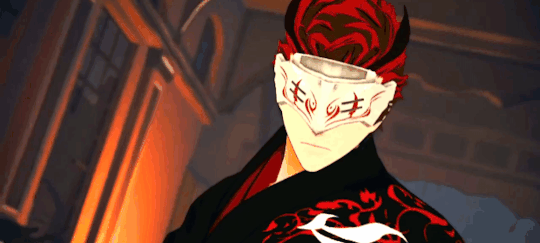
It also doesn't fall into another common pitfall: the idea that people have to be perfect to be victims of discrimination. The White Fang... has senselessly and cruelly murdered people; doesn't mean faunus discrimination isn't also cruel and senseless and doesn't justify it. And this is something that we do see in real life too--people trying to either completely whitewash the actions of radical anti-oppression movements, which can do awful things, or trying to use these awful things as evidence that these people deserve discrimination when really it's a result of rage and desperation at a society that refuses to give them anything. That doesn't justify the pain of the victims of the awful things (see, Weiss) but nor does it negate the righteousness of that anger.
It does portray the faunus as a fairly diverse group too, when fiction often portrays marginalized groups as a monolith. That's not true. People from one group have very different ideas about what liberation looks like, and what they want to achieve. People in marginalized groups are people, and they can be motivated by a variety of selfless principles and egotistical validation, and neither negate the other. See, Sienna vs. Ghira vs. Adam.
Now, of course within RWBY Ghira's more nonviolent principles more or less win out. That's because RWBY is again a fairy tale where you have to fight to live, but that also doesn't endorse violence. If you expected otherwise, wrong genre. Of course the real world is far more complex, but it's not as if there is no real world basis for this either. Peacemakers exist, and nonviolence has accomplished a lot before. Whether or not that's the be-all-end-all of the faunus struggle in RWBY isn't even clear, so I don't think it's intended to be the be-all-end-all preached moral as it applies to the real world either.
Story-wise, the White Fang functions as a Jungian shadow of society. If you do not take charge of your own life, you are letting others decide for you. The faunus who disagree with the White Fang take it back, because they have to acknowledge it to move forward in society. They have to integrate with it, and accept their own humanity: capable of good and what they might rather deny.

This faction--the faunus who don't like the White Fang--are represented in Ghira, who becomes passive and steps back from aspects of the movement. However, when Blake arrives in Menagerie, this changes, because Blake's entire arc is about integration. Ghira then becomes active, working for the rights of the faunus and for the White Fang to be better rather than simply disavowing the White Fang in an attempt to be a good person, because doing nothing isn't exactly good.
On a more character level, the White Fang exists for Blake's arc. Her Jungian archetype is the Shadow. Like, it's literally her semblance's name. Hence, the idea of the shadow is gonna be important. If you want more on this, @aspoonofsugar has written a meta on it here and another here.
So, for Blake, on a personal level the White Fang (especially under Adam) represents the parts of herself she doesn't like. The part that ran from her family. The part that is violent. And yet, she cannot abandon it or simply disavow it. No, the answer is instead:
We’re not going to destroy the White Fang. We’re going to take it back.
She has to integrate with it, take the good--the righteous anger, the focus on justice and equality.
The White Fang also comments on the microcosm/macrocosm of alchemy.

For the unaware, RWBY is an alchemical story, and the principles of alchemy are represented in the symbol for the philosopher's stone, as seen above. Microcosm: the smaller circle enclosing two people in the center who come together (hence chemical weddings). The square is the four elements: water, earth, fire, air. The triangle is body, heart, and mind. The larger circle is the macrocosm.
The Shadows for Blake on a personal level--microcosm--is Adam. The Shadow on a worldwide, big picture scale--the macrocosm--is the White Fang. Integrating with the shadow isn't only an individualistic endeavor, but also one that benefits society as a whole and brings life to the entire world. The main point of alchemy's philosopher's stone, which Blake, along with the rest of RWBY, are symbolically being transformed into.
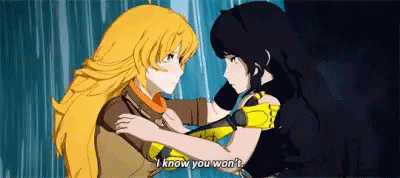
I think the main issue with the White Fang, by the way, is its handling of Adam. Typically you don't kill the shadow, though I do think Blake kinda had no choice. Still, I don't think the show fully explored him.
Yet what does work with what we have is that Yang has to face Adam, Blake's shadow, to be with Blake. Yang losing her arm to Adam parallels her being upset about losing Blake to fear, because symbolically Blake can hurt her deeply in the way only a lover can. Blake has to stop running from her shadow and allow herself ot be known and seen by Yang to be with her.
#ask hamliet#rwby#rwby meta#blake belladonna#yang xiao long#white fang#adam taurus#bumbleby#sienna khan#ghira belladonna
176 notes
·
View notes
Text
There are two related things I've noticed coming from the left that I really want people to examine deeply in themselves, because it's a major problem that I see happening over and over again. The whole I/P issue is the most currently salient example, but it is one of many.
1. There's this tendency towards retributive justice, wherein the solutions proposed fail to take into account whether the proposed punishment is at all proportional to the alleged crime, but rather is just treated as the natural consequence of that action.
2. This same principle is also extended backwards in time and used to excuse violence post hoc that they might not have chosen as an ideal punishment but have nevertheless decided was deserved because that person [allegedly] did something bad.
Both betray an underlying punitive or retributive justice mentality, where the goal is not restoration or reconciliation + accountability, but rather punishment. (There are some interesting religious and cultural aspects to this I could get into but don't want to derail this post.)
This untethering of crime to punishment in terms of (a) due process, (b) proportionality of punishment to the crime, and (c) a failure to consider restorative justice, reconciliation, and teshuva processes instead of retribution leads to monstrous and morally bankrupt results.
Put another (blunter, crasser) way: the left's longstanding hard-on for vigilante violence is a critical failure that undermines the entire movement.
You cannot base your politics on humanism, compassion, and due process out one side of your mouth and then cheer on vigilante violence, cruel and unusual punishment, and mob mentality out the other. It doesn't work like that.
Now I understand that sometimes armed resistance is necessary. People living under authoritarian and inhumane conditions may, out of necessity, turn to guerrilla warfare and unofficial armed resistance in self-defense. But even that has limits. When leftists fantasize about death by curb stomping or slitting someone's throat as a good thing, they are imagining this happening to armed fascists, Nazis, white supremacists, or possibly other categories of irredeemable people such as domestic abusers who maim or kill their partner &/or children, pedophiles, human traffickers, etc.
What they aren't imagining is the other side of that coin, which is the alt-righter who murdered Heather Heyer with his car, abortion clinic bombers, violent Q-anoners or terrorists. Each of those people also believe in the justice of their actions and their entitlement to act as arresting officer, judge, jury, and executioner.
"But those people are wrong!"
So? Why do you get to decide that for everyone? What about the people who think YOU are wrong?
There's a reason courts and due process exist. It's the same reason why "free speech" protects the speech you hate, why freedom of the press protects that rag whose opinions you hate, and why free exercise of religion protects shitty religious groups you wish to see gone. It's because we live in a society and you aren't the arbiter of justice for everyone. If you give in to that mentality, you will inevitably end up in a "might makes right" society, which never ends well, particularly for marginalized people.
If you wouldn't accept l'chatchila a certain punishment being administrated by a court of law without outcry and protest for human rights abuses, then don't cheer it on b'dievad. Either rape is unacceptable or it's not. Either torture is unjustifiable or it isn't. Either maiming is an acceptable punishment for certain crimes or it isn't. You either support the death penalty by certain methods (beheading, burned alive, strangled, hacked apart, stoning, hanging, etc.) or you don't. Collective punishment is either acceptable or it isn't. Vicarious punishment is either acceptable or it isn't.
All of those things are either human rights abuses, or they aren't. All of them fall outside even the rules that might permit self-defense or guerrilla warfare or other uprisings of the oppressed.
Due process is the same - either you believe in due process and the right to a fair and timely trial, or you don't. The moment you support one extrajudicial punitive killing, you have opened the door to the justification of murder, provided the killer has sufficient justification.
It's true that the rules of armed conflict and war are different, but that they exist at all is relevant here too. The reason they exist is to minimize suffering during an event that is guaranteed to cause great suffering. It's the same reason why the laws of self-defense are different than the laws of intentional murder.
The truth is that in order to live in a just and civilized society, there must be specific rules that govern the administration of conflict resolution and harm. These rules must be enforced consistently and equally, and the decider of fact must have reasonable access to the evidence that exists. The state or any court of law or other tribunal must render its decision in the most impartial way possible, even for the worst, most obviously guilty people. Even those that commit heinous crimes must be given those same rights. Without those safeguards, you create the opportunity for bad faith actors to label their undesirable groups or individuals as whatever category people find so despicable that they fall out of being considered human and lose their claim to human rights protections. It must therefore be impossible to forfeit your right to due process and freedom from vigilantes and mobs.
352 notes
·
View notes
Text
DON'T LET THOSE TYPES OF PEOPLE GET IN THE WAY OF YOUR SUCCESS.
STEPS TO DETACHMENT AND MOVING IN SILENCE.
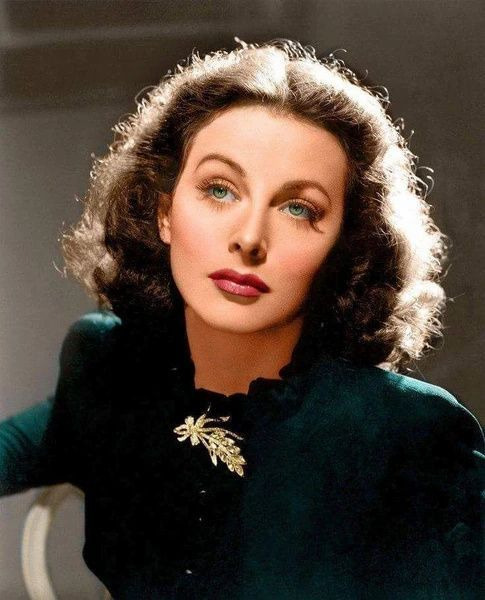
Let them be who they are, let them stay where they are, let them think what they think. But remember this, what you are planning is something they could never achieve. Pull through in the new year and do the things you've put aside and neglected so that when you can reflect on what you've accomplished, you can tick off the majority.
Embarrassment and shame are real, I understand that. I also go through moments where I'm haunted by the same "embarrassing" memory. But now is when we can both change, we can choose to let go of those daunting memories and live our lives to the fullest. We may have goals that the person next to us could laugh at, but imagine how good it would feel to be doubted at first and then proving them wrong later.
Staying strong is difficult, especially if you have wavering faith in your beliefs and actions, and if that's the case, that's exactly what you are going to work on.
1) HAVING A BELIEF
Having a belief in something will help you in your confidence exponentially. Whether that is in God, having a strong self-concept or in the universe.
Having faith in something gives you a dependable foundation, offers guidance, and keeps you grounded. Having a belief will also replace the desire for validation from others around you since having that validation will conflict with said belief.
2) HAVING A PLAN
Having a plan will also help your confidence. When others doubt your aspirations, you will only doubt yourself if you feel like you can't achieve them. But if you have a plan, you have no reason to doubt yourself because you know what it will take to achieve your goals, you will know the steps to go through to make your dreams a reality. This will bring reassurance, which will result in boosted self-esteem.
3) DON'T TAKE ANYTHING PERSONAL
Understand that not everyone will be fond of you, and it's impossible to win everyone over. ("A friend to all is a friend to none" - Aristotle.)
People will act out of jealousy when they see you better yourself, gradually surpassing them. Perhaps they're feeling jealous because you excel in something they don't, or they envy you for achieving what they couldn't. If you take this personally, it means they have succeeded in bringing you down to stay on their level or even below it. If people criticize you for pursuing your goals, take it as a sign that you're on the right track. As you achieve more success, more people may start hoping for your downfall. Beware of these types of people, some may even be the ones closest to you (monitoring spirits.)
4) DETACHING AND PERSERVERING THROUGH
Practice mindfulness to stay present and detach from overwhelming thoughts. Meditation can help you observe your thoughts without getting entangled in them. Allocate specific times each day for your worries to surface freely. This prevents them from dominating your entire day. For instance, during a bath, take the time to thoroughly reflect on the day, welcoming both negative and positive thoughts. Allow yourself to fully experience those moments. Once they've passed, release and journal the thoughts and feelings that came up.
Understand that you can't control everything. People will think what they want, and realising you can't control their thoughts is the first step to detaching. Release the grip on issues beyond your reach, and it'll free up your mind. Focus on what you can change, and you'll gain a lot of mental clarity.
Persevering is fueled by determination and desire. If you come out publically with your aspirations and back down, then it gives people more things to laugh at. Let them laugh until they become silenced by your achievements. Let that statement discipline you.
5) MOVING IN SILENCE
Moving in silence involves taking intentional actions without announcing them to the world. If you fear that others may sway you with their words or that you may back down easily, move in silence. Don't tell a soul about your plans and goals. The less people know, the less that can be used against you. Only tell those who you are certain will be your support system.
Set Clear Goals: Define your objectives clearly. Having a roadmap for yourself will guide your actions.
Stay Focused: Concentrate on your work and avoid unnecessary distractions. Maintain a laser focus on your goals.
Work Consistently: Take consistent, daily actions toward your goals. Small, regular efforts can lead to significant achievements over time.
Avoid Unnecessary Attention: Minimise sharing every detail of your journey on social media or with everyone. Keep some aspects private.
Build a Support System: Share your aspirations with a select few who genuinely support you. Their encouragement can be invaluable.
Let Success Speak: Instead of talking about your plans, let your achievements speak for themselves. People will notice your results.
Learn Quietly: Acquire new skills or knowledge discreetly. You don't always need to announce your learning process.
Embrace Patience: Moving in silence requires patience. Success often takes time, and it's okay if results aren't immediate.
Embody your potential.
#dream girl#self worth#that girl#self improvement#self esteem#self confidence#self growth#dream life#detachment#faith#successmindset#successful
155 notes
·
View notes
Text
Yes, there are gay characters in Tolkien’s books
There seems to be an entrenched view among Tolkien fans that Tolkien did not write any gay characters, and that by interpreting any of his characters as gay you are going against what he would have wanted. Homophobes obviously believe this very strongly, and have always been hostile towards queer fans and queer interpretations of Tolkien’s works. Many members of the LGBTQ community also believe that they’re contradicting canon when they interpret Tolkien’s characters as gay—the only difference is they don’t mind doing so.
But is it so against canon to interpret any of Tolkien’s characters as gay? The assumption that Tolkien did not write gay characters hinges on his Catholicism, but I’m going to explain why this is flimsy reasoning.
First, it should be noted that Tolkien didn’t leave any writings expressing his views on homosexuality, so there is no evidence one way or another. But it seems relevant that Tolkien was good friends with W.H. Auden and corresponded with him over multiple decades. They first met when Auden listened to one of Tolkien’s lectures at Oxford and was inspired to learn Anglo-Saxon. Auden loved Tolkien’s poetry and prose and defended LOTR from critics at a time when it was seen as an unserious work in an unserious genre. Did Tolkien know Auden was gay? We don’t know for sure. But there’s at least a chance that he did: the secret of Auden’s homosexuality is one he “loosely kept”, according to an article in the Guardian.
So, Tolkien was friends with a gay man whom he may or may not have known was gay. But are there gay characters in Tolkien’s books? Unfortunately for the homophobes, even if you believe that Tolkien opposed homosexuality on principle, that still doesn’t mean no one in Middle-earth is gay. Actually, no one in Middle-earth is Catholic. I mean that literally, in the sense that Catholicism does not exist in the time period Tolkien wrote about, but I also mean it in the sense that Tolkien’s characters need not adhere to the tenets of his religion, even if it’s not named. Why would they?
It shouldn’t be controversial or surprising to point out that writers can, and often do, write characters that live very different lives from their own. Needless to say, Tolkien didn’t condone the actions of the antagonists of his work, but what about the protagonists? Are we to believe that all of them act in an unfailingly Catholic way at all times? In Laws and Customs of the Eldar, it is strongly implied that (especially in their younger years) Elves do have sex for pleasure and not just to beget children, something that is discouraged by Catholicism. That’s just one example.
(Please note that I’m not arguing that Tolkien’s Catholicism had no influence on his writings, because he explicitly said that it did. I’m saying that Tolkien’s characters themselves are not Catholic and do not necessarily behave like Catholics. So even if you think that all Catholics believe homosexuality is wrong, it has no bearing on Tolkien’s stories.)
Another line of reasoning goes that homosexuality is too taboo for Tolkien—but I have to wonder if people who believe this have read his books at all. The Silmarillion is full of taboo subjects. Túrin and Niënor marry, not knowing they are brother and sister; they find out the truth, and that she is pregnant, and they both commit suicide. Eöl’s relationship with Aredhel is one that, even if it didn’t start out as controlling and abusive—although I suspect it did—it clearly ended up that way, and depending on your interpretation of the text, he may have raped her. Celegorm attempts to force Lúthien to marry him, which would also involve rape, and there is a passage that implies that Morgoth also intends to rape Lúthien. Neither incest, rape or abuse are too taboo for Tolkien—neither are suicide, torture or mass murder, as the rest of the Silmarillion shows.
I don’t want anyone to take this in bad faith: I’m not saying that being gay is comparable to incest, rape or abuse, and I’m part of the LGBTQ community myself. What I am saying is that Tolkien clearly did not shy away from certain subjects, including sexual taboos, simply because they’re taboo. If you’re going to argue that none of Tolkien’s characters are queer because it wasn’t accepted at the time, that’s very unconvincing given the other subject matter in his books.
There is another reason why I think there are gay characters in Middle-earth, and it has to do with Tolkien’s inspirations. It’s well understood by Tolkien fans that you can see echoes of other mythologies in Tolkien’s works. But which ones? When Lúthien brings Beren back from the Halls of Mandos, there are obvious parallels with the myth of Orpheus and Eurydice—though the genders are reversed, and Lúthien succeeds where Orpheus did not. There are parallels between Túrin and Kullervo. There are numerous examples of this kind of thing throughout the Silmarillion and LOTR. Even the name Middle-earth clearly has its roots in the Norse name Midgard. There are some influences that Tolkien explicitly acknowledged, like the Kalevala and the Völuspá, and some that Tolkien scholars have only theorized about. While there are some scholarly articles on Tolkien and the Aeneid, one thing I have never seen anyone discuss is the parallel between Beleg’s death and the story of Nisus and Euryalus.
In the Aeneid, Nisus and Euryalus are a pair of friends and lovers who are fighting for Aeneas in Latium. Nisus, the older of the two men, is said to be a skilled javelin-thrower and archer. Nisus proposes a night raid on an enemy camp, and Euryalus insists on going with him. During the raid they kill many men in their sleep, collecting some of their armor as loot, as was customary. But when they leave the camp, the glint of light on a helmet taken by Euryalus is seen by a group of enemy horsemen, who capture and kill him before Nisus can stop them. Nisus is distraught and kills many of them in retaliation, ultimately dying beside his lover’s body. (In some versions, it’s a stolen belt, not a helm—but the constant motif is the glint of light that reveals Euryalus to the enemy.)
There are so many similarities with Beleg and Túrin that it cannot be a coincidence. Beleg and Túrin also fight side by side, first on the marches of Doriath and later when Túrin is an outlaw. They are very loyal to each other, and clearly love each other. Like Nisus, Beleg is known to be a great archer. Meanwhile, although it does not feature in Beleg’s death scene, Túrin is associated with a particularly significant helm. There are differences too: Túrin’s captivity is the reason for Beleg’s raid on the Orc-camp, whereas Euryalus is captured after the raid; both Nisus and Euryalus are slain one after the other, whereas only Beleg dies in the raid on the Orc-camp. But there is still the overarching parallel of the night raid, in which the enemy guards are killed silently in their sleep; the raid’s connection with an attempted rescue; the chance moment that leads to the tragic death; the imagery of the flash of light; and the distraught reaction of Nisus and Túrin when they see that Euryalus and Beleg are dead. Tolkien read the Aeneid as a student and so would have been familiar with its contents.
There is also the fact that in some versions of the story Túrin kisses Beleg on the mouth in this scene. Although kissing someone on the mouth has not always been a romantic gesture in all cultures and time periods, the clear parallels to the scene in the Aeneid lead me to think that it is in this case. Whether you see the relationship between Túrin and Beleg as romantic is up to you—all that I’m trying to do is show that it’s a legitimate interpretation.
Ultimately, like I wrote here, I don’t think you need permission from anyone in order to interpret Tolkien’s stories the way you want to. If you want to interpret one of his characters as gay, you don’t need to cite obscure plotlines from the Aeneid to justify it. But I do take issue with the idea—which is so pervasive in the fandom—that Tolkien’s stories must not have gay, or bisexual, or trans people in them, and that any interpretations to that effect are against canon. At the end of the day, Middle-earth is supposed to be our world, and guess what? Queer people exist.
#lotr#tolkien#lord of the rings#silmarillion#my writing#Most of the people I encounter in the Tolkien fandom are either members of the LGBTQ community themselves or supportive of it#but once in a while the homophobes rear their ugly heads#I’ve been wanting to write a post about the Beleg/Turin/Nisus/Euryalus parallel for a while now#Plus I’m a Latin nerd myself and also studied the Aeneid in school!#For the record I call that plot line obscure because it’s obscure nowadays but I don’t think it would have been obscure to Tolkien#like I said in the post#and the parallel really adds to the romantic subtext between Beleg and Turin#I do believe it was intentional
775 notes
·
View notes
Note
Helloo! I don’t know if you remember me but I sent you once something about Yui in LE and now, after I played some routes, I can confirm that she’s my last fav Yui. 😬
// I have a complicated relationship with LE Yui, haha. I appreciate her for being more lively than CL Yui, but she mostly gave me the ick because she was definitely one of the most annoying LE characters.
I typically don't mind characters that are represented as jerks and upright mean, since you know what to expect from them, but I really dislike when characters who are portrayed as goody-shoes, do such messed-up and morally wrong things.
When I first went through LE, I didn’t start with Ayato’s route, given that I heard from many people about how tough it is and I wasn't emotionally prepared, so I started with others. I didn't like how she talked ill about her lover behind his back (more than once) and how her foolishness caused her to disclose critical secrets to people she shouldn't have and get into more troubles than normal. Nonetheless, I didn't think she was too bad… until Ruki's route, where she convinced the Mukami brothers that Karl wasn't a bad person because he returned their lives to "redeem" himself when we all know he only used them as pawns. But, if I thought THIS was bad, Ayato's LE route came.
~Things wrong with Yui in Ayato’s LE route~
1. Tried to convince Ayato that his abuser, Cordelia, genuinely cared for him. Given that his mother damaged his life, it's understandable that he would react negatively.
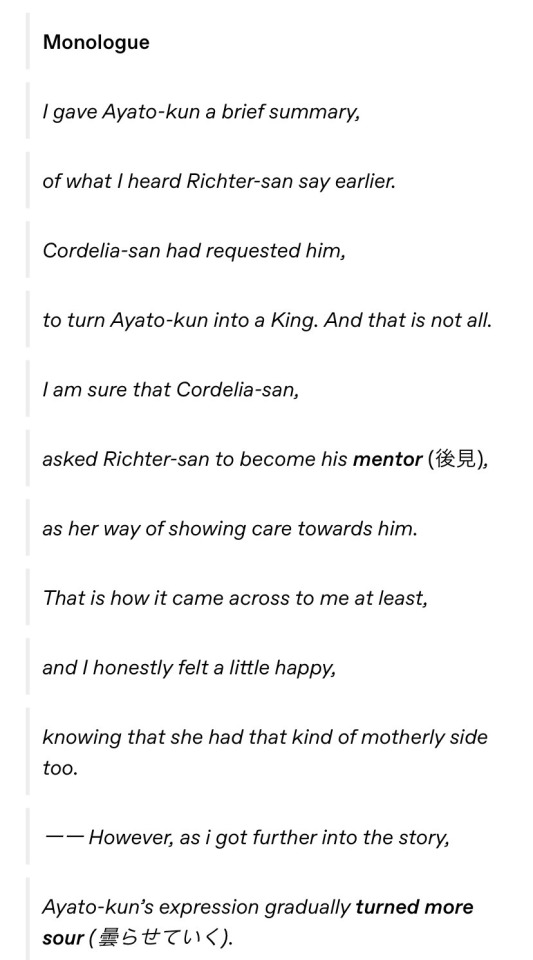
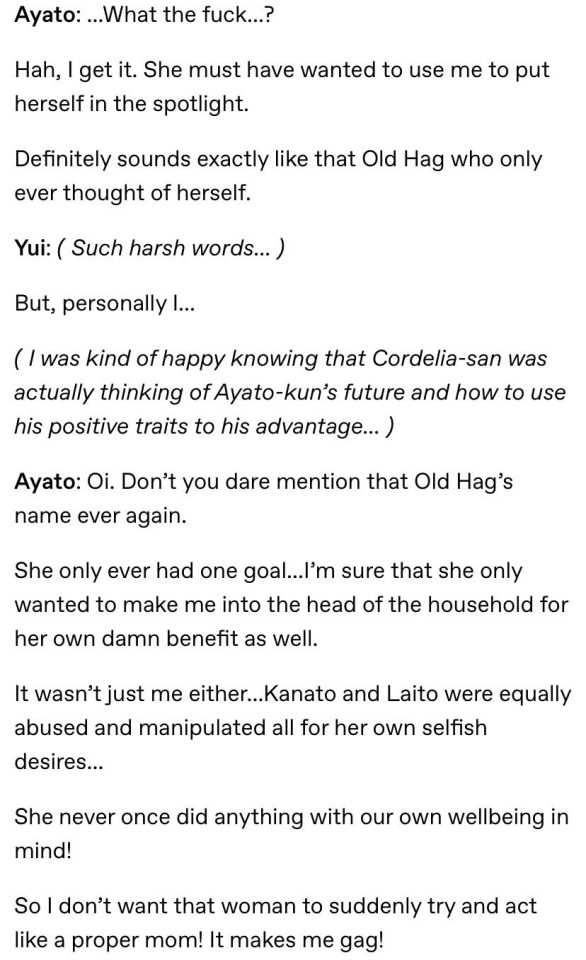
2. The main reason why Ayato didn’t want to trust Richter, wasn’t necessarily his trauma, but the fact Richter actually hurt Yui and, in his book someone hurting his girlfriend is unforgivable. Nevertheless, when his brothers started a scandal about Richter and all ganged up against Ayato, not even letting him express HIS point of view, Yui did nothing but stand there staring. Although, after Ayato blew up the mansion again as a result of reactive abuse, she acknowledged that his brothers attacking him like that wasn’t right, but she still didn’t say it out loud to defend him, when she knew the reason behind his actions.
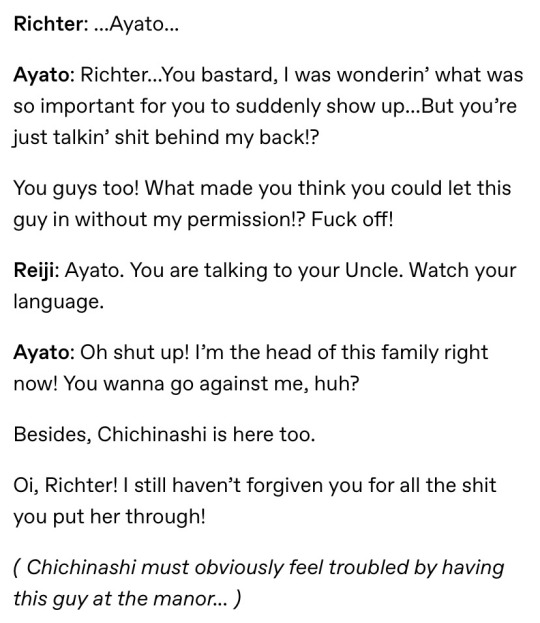
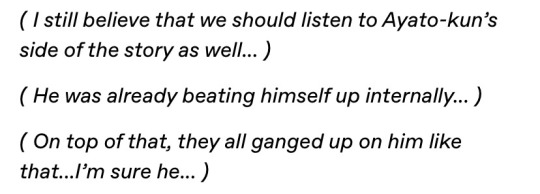
3. After Reiji and Ruki became Ayato's enemies, she went to them without telling him, which made him concerned, to convey her man's sadness and loneliness. I'm sorry, but this was the dumbest plan ever, considering that it was evident they wouldn't have cared about it, and hearing such a thing made them even more eager to mock and plot his downfall. In the end, despite her good intentions, she solved nothing but made things worse, including being bitten by Reiji, which caused Ayato to lose his mind. Based on the previous events, I'm not shocked he believed she would betray him.
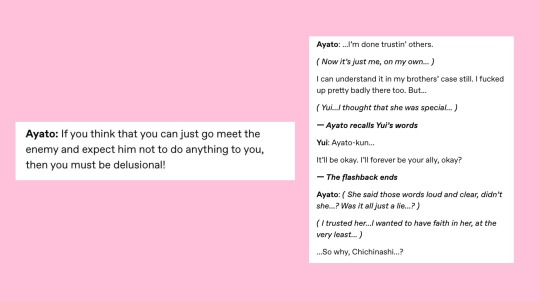
4. The scenes in which Ayato began acting coldly towards her were the highlights of his LE route. In other LE routes, after doing or saying stupid things, the disputes were resolved in the next chapter or those actions were never mentioned, but I enjoyed how she was actually humbled here. I adore Yui in general, but in LE, she deserved this treatment.
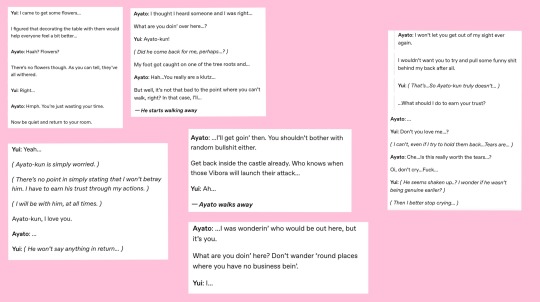
5. I assumed she had learnt her lesson, given that Ayato still cared for her despite his coldness, but then she goes to the Viboras to prove herself worthy of his trust. I liked how she tried to solve something (even if she didn't), but what made her behavior even WORSE was that 1) she justified Ruki giving Ayato a hard time and joining forces with the Church to kill him, and 2) she talked ill behind her lover's back despite telling Ayato the exact opposite face to face. I understand that Ayato didn't act very king-like, but at the same time, no one truly took him seriously or believed in him. Also, idk, but she should have tried to defend him, at least this time, instead of empathizing more with someone who hurt her man—?
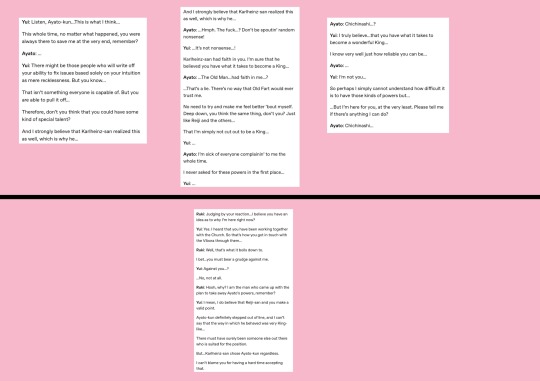
Credit to: dialovers-translations on Tumblr
I also find it amusing how LE is the only main DL game with no wedding at all, especially since Ayato was usually the one to marry her. I think he secretly didn't want it in LE, given that he didn’t even think of proposing. :”)
She’s definitely not a bad girlfriend though, but I wouldn’t call her a very good one either. I think that’s another reason why I don’t want a new game. I’m afraid they’ll ruin her even more. T-T
98 notes
·
View notes
Text
One thing that TotK does constantly but really doesn't land for me when compared to BotW is that every NPC loves Zelda so much.
She is the sweetest, and she loves animals and is the very best at them, and she goes to every major landmark to spend time there and also she teaches the people secrets about the lands they have always lived in and they're like woow thanks zelda incredible I'll change my entire ways because you were just SO enlightening (Lurelin + Gerudo Town feeling particularly questionable here for obvious reasons), and she's so wise and beloved and talented --to the point that nobody (beyond the Zora King) even dares to question her actions when she starts acting off.
(Yunobo please stop letting her walk all over you, like it's alarming that you understand she basically brainwashed you and your entire race, and you're still running after her like a lost puppy for an explanation that will surely make everything make sense instead of, like, punting her into the sun? I know it's the eeeevil zelda, but that this situation could even remotely begin to happen feels... so offputting.)
In BotW, the rare mentions of Zelda worked because 1) she was an ancient figure and the modern hylians knew very little about her and would build her up as a legendary figure accordingly, 2) she was literally giving her life for them (I mean she kind of still does here but people do not know that or cannot infer that in any way --which is its own sort of problem), 3) she was extremely hard on herself, felt like a failure and... kind of was one (and she was given shit for it).
(also in BotW we are in a post-Hyrule kingdom world, while here we're living its re-foundation, and so it feels very... convenient that they excavate a previous version of their perfect kingdom to boister up the hylian claim upon the lands also --but that's beyond the topic)
So for anyone to give her grace and compassion in BotW, while a little eyeroll worthy at times, was endearing and made sense. None of this was her fault; she may have extreme power, but she didn't directly yield it --her imperfections the byproduct of a stressful situation every champion was being forced into due to the tides of fate. Also the king was criticized for being a little ruthless and asking too much of his subjects, including his own daughter. There was solidarity between you and everyone else at the same level.
But here? I don't know, it feels like the entire kingdom is terrified that the sheikah secret police will drag them back in the Bottom of the Well if they breathe wrong when talking about their beloved princess, it's so unsettling. I liked BotW Zelda, but... I don't know, I'm literally more comfortable around fake Zelda than the real one. Fake Zelda feels more like a real person that she does.
#totk#totk spoilers#totk critical#botw#zelda#they went so black and white in their writing they kind of turned hyrule into psychological horror#it's genuinely hard to feel like you're fighting for the good guys#and that you're not being puppeteered for darker purposes#like honestly if it was revealed midgame that Ganondorf straight up did not exist and was made up to reassert zonai domination or whatever#I would have been Ahhhh! Yes this actually makes sense now#I don't know totk's worldbuilding is so unsettling to me haha
284 notes
·
View notes
Text
Is your pro-Palestine activism hurting innocent people? Here's how to avoid that. (Plain text version)
I kept getting "needs pt" tags on the original post, so here's the plain text version:
Over the last few days, I’ve had conversations with several Jewish people who told me how hurt and scared they are right now.
To my great regret, some of that pain came from a poorly-thought-out post of mine, which – while not ill-intentioned – WAS hurtful.
And a lot of it came from cruelty they’d experienced at the hands of people who claim to be advocating for Palestine, but are using the very real plight of innocent Palestinians to harm equally innocent Jewish people.
Y’all, we need to do better. (Yes, “we” definitely includes me; this is in no small part a “learn from my fail” post, and also a “making amends” post. Some of these are mistakes I’ve made in the past.)
So if you’re an advocate for Palestine who wants to make sure that your defense of one group of vulnerable people doesn’t harm another, here are some important things to do or keep in mind:
Ask yourself if you’re applying a standard to one group that you aren’t applying to another.
Would you want all white Americans or Canadians to be expelled from America or Canada?
Do you want all Jewish people to be expelled from Israel, as opposed to finding a way to live alongside Palestinian Arabs in peace?
If the answer to those two questions is different, ask yourself WHY.
Do you want to be held responsible for the actions of your nation’s army or government? No? Then don’t hold innocent Jewish people, or Israelis in general (whether Jewish or otherwise), responsible for the actions of the Israeli army and government.
On that subject, be wary of condemning all Israeli people for the actions of the IDF. Large-scale tactical decisions are made by the top brass. Service is compulsory, and very few can reasonably get out of service.
Blaming all Israelis for the military’s actions is like blaming all Vietnam vets for the horrors in Vietnam. They’re not calling the shots. They aren’t Nazis running concentration camps. They are carrying out military operations that SHOULD be criticized.
And do not compare them or ANY JEWISH PERSON to Nazis in general. It is Jewish cultural trauma and not outsiders’ to use against them.
Don’t infuse legitimate criticism with antisemitism.
By all means, spread the word about the crimes committed by the Israeli army and government, and the complicity of their allies. Criticize the people responsible for committing and enabling atrocities.
But if you imply that they’re committing those crimes because they’re Jewish, or because Jewish people have special privileges, then you’re straying into antisemitic territory.
Criticize the crime, not the group. If you believe that collective punishment is wrong, don’t do it yourself.
And do your best to use words that apply directly to the situation, rather than the historical terms for situations with similar features. For example, use “segregation,” “oppression,” or “subjugation,” not “Holocaust” or “Jim Crow.” These other historical events are not the cultural property of Jews OR Palestinians, but also have their own nuances and struggles and historical contexts.
Also, blaming other world events on Jewish people or making Jewish people associated with them (for instance, some people falsely blame Jewish people for the African slave trade) is a key feature of how antisemitism functions.
Please, by all means, be specific and detailed in your critiques. But keep them focused on the current political actors – not other peoples’ or nations’ political or cultural histories and traumas.
Be prepared to accept criticism.
You probably already know that society is infused with a wide array of bigotries, and that people growing up in that environment tend to absorb those beliefs without even realizing it. Antisemitism is no exception.
What that means is, there’s a very real chance that you will screw up, and get called out on it, as I so recently did.
If that happens, please be willing to learn and adapt. If you can educate yourself about the suffering and needs of Palestinians, you can do the same for Jewish people.
Understand that the people you hurt aren’t obligated to baby you. Give them room to be angry.
After I made a post that inadvertently hurt people, some were nice about it, and others weren’t. Some outright insulted my morals and intelligence.
And I had to accept that I’d earned that from them.
I’d hurt them, and they weren’t obligated to be more careful with my feelings than I had been with theirs.
They weren’t obligated to forgive me, trust me, or stop being mad at me right away.
I’ll admit, there were moments when I got defensive. I shouldn’t have. And I encourage you to try not to, if you screw up and hurt people.
I know that’s hard, but it’s important. Getting defensive only tells people you care more about doubling down on your mistake than you do about healing the hurt it caused.
Instead, acknowledge that they have a right to be angry, apologize for the way you hurt them, and try to make amends, while understanding that they don’t owe you trust or forgiveness.
Be aware that some antisemites are using legitimate complaints to “Trojan horse” antisemitism into leftist spaces.
This is a really easy stumbling block to trip over, because most people probably don’t look at every post a creator makes before sharing the one they’re looking at right now.
I recently shared a video that called out some of the Likud and IDF’s atrocities and hypocrisy, and that also noted that many Jewish people are wonderful members of their communities.
I was later informed that, while that video in particular seemed reasonable, the creator behind it is frequently antisemitic.
I deleted the post, and blocked the creator. I encourage you to do the same if it’s brought to your attention that you’ve been ‘Trojan horse’d.
EDIT: Important note about antisemitism in leftist spaces:
While it's true that some blatant antisemites are using seemingly reasonable posts to get their foot in the door of leftist spaces, it's also true that a lot of antisemitism already exists inside those spaces.
This antisemitism is often dressed up in progressive-sounding language, but nonetheless singles Jewish people and places out in ways that aren't applied equally to other groups, or that label Jewish people in ways that portray them as acceptable targets.
If you want to see some specific examples, so you can have a better idea of what to keep an eye out for, I suggest reading this excellent reblog of the original post.
Fact-check your doubts about antisemitism.
Depending on which parts of the internet you look at, you’ve probably seen people accused of antisemitism because they complained about the Likud and/or IDF’s actions. So you might be primed to be wary, or feel unsure of how to tell what counts as real antisemitism.
But that doesn’t mean antisemitism isn’t a very real, widespread, and harmful problem. And it doesn’t mean many or even most Jewish people are lying to you or being overly sensitive.
So if someone says something is antisemitic, and you aren’t sure, I encourage you to:
A. Look up the action or thing in question, including its history. Is there an antisemitic history or connotation you aren’t aware of? For best results, include “antisemitic” in your search query, in quotes.
B. Understand that some things, while not inherently antisemitic, have been used by antisemites often enough that Jewish people are understandably wary of them. Schrodinger’s antisemitism, if you will.
C. Ask Jewish people WHO HAVE OFFERED TO HELP EDUCATE YOU. Emphasis on WHO HAVE OFFERED. Random Jewish people aren’t obligated to give you their time and emotional energy, or to educate you – especially on subjects that are scary or painful for them.
@edenfenixblogs has kindly offered her inbox to those who are genuinely trying to learn and do better, and I’ve found her to be very kind, patient, reasonable, and fair-minded.
Understand that this is URGENTLY NEEDED.
In one of my conversations with a Jewish person who’d called me out, they said this was the most productive conversation they’d had with a person with a Palestinian flag in their profile.
THIS IS NOT OKAY.
I didn’t do anything special. All I did was listen, apologize for my mistakes, and learn.
Yes, it feels good to be acknowledged. But I feel like I’ve been praised for peeing IN the toilet, instead of beside it.
Apologizing, learning, and making amends after you hurt people shouldn’t be “the most reasonable thing I’ve heard from a person with a Palestinian flag pfp.”
It should be BASIC DECENCY.
And the fact that it’s apparently so uncommon should tell you how much unnecessary stress and fear Jewish people have been living with because of people who consider themselves defenders of human rights.
By all means, be angry at the Likud, the IDF, and the politicians, reporters, and specific media outlets who choose to enable and cover up for them.
But direct that anger toward the people who deserve it and are in a position to do something about it, not random people who simply happen to be Jewish, or who don’t want millions of people to be turned into refugees when less violent methods of achieving freedom and rights for Palestinians are available.
Stop peeing beside the toilet, people.
#I/P#I/P conflict#I/P war#Israel#Palestine#Gaza#free Palestine#Israel Palestine conflict#Israel Palestine war#Jewish goyim solidarity#choose peace
178 notes
·
View notes
Text
Alright, last time ever that I’ll talk about Velma. I promise.
Because I’ve been extra salty towards this show all week, and I don’t want to take it further than that. Talking nothing but bad stuff about this show for the entirety of its run is exactly what the writers want. They want us to hate watch it so we can talk about each new atrocity the show brings up week after week, and call us haters or anti-woke propagandists. When, in reality, they don’t give a FUCK about any of that. They don’t care about other races, genders, or sexualities. They just WANT you to think they do. Know how I can tell? Because I’ve SEEN genuine attempts of representation.
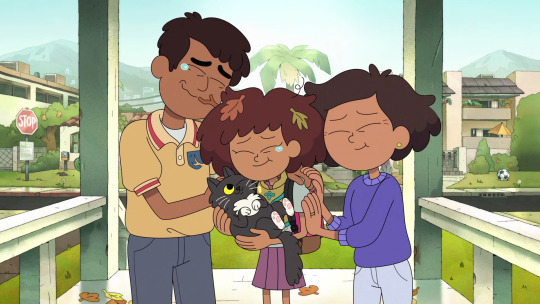
THIS is a genuine attempt of representation. Matt Braly, the series creator of Amphibia and a Thai-American, felt like Thai culture was underrepresented in media. So, he not only made his main character and her Thai, but he also dedicated subplots and entire episodes showcasing the culture he wanted to represent.
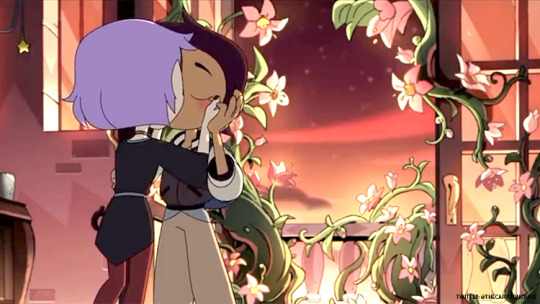
THIS is a genuine attempt at representation. Dana Terrace, series creator of The Owl House and open Bisexual, wanted a main character that was explicitly bi to finally help kids feel like they’re seen. To help give the representation SHE always wanted.
But when I look at Velma? None of it hits the same.
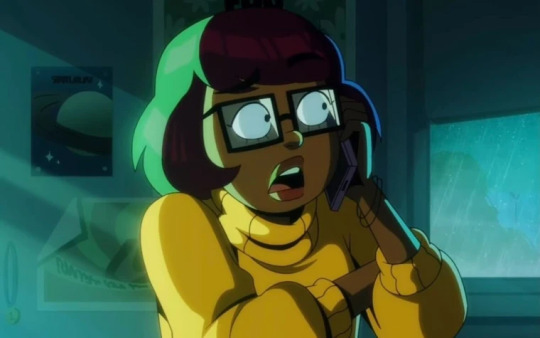
This isn’t a genuine attempt for representation. This is Mindy Kuling turning a character into a self-insert to make herself look smarter than everyone else and the most important person in a narrative. Truth is, this Velma is nothing more than a sociopath, narcissistic dipshit who thinks she’s better than everyone else but is actually more aggravating than endearing.
So...Good job representing YOURSELF there, Mindy.
And this?
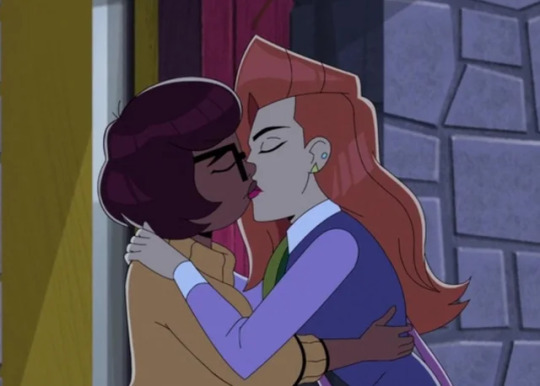
This isn’t representation. This is a shield.
A way to protect the show from any criticism because it couldn’t possibly be bad. They have gay characters! Gay characters are good in everything!
Except that is the LAST reason you should include gay characters! Don’t get me wrong, I LOVE more LGBTQA+ representation in media. What I don’t love is obvious attempts to pander to audiences just to avoid criticisms. And keep in mind, this is NOT the first attempt a creator wanted to make Velma gay.
James Gunn wanted to make her gay in the live action movie, but WB said no.
Scooby-Doo: Mystery Incorporated (the GOAT of the Scooby-Doo franchise) wanted to make Velma gay, but could only imply it because Cartoon Network didn’t greenlit Steven Universe yet.
THOSE are genuine attempts to make Velma gay, to represent people because the creators of both products agreed that it was the least they could do.
But making Velma and Daphne a thing just to protect a show is nothing more than shallow and inconsiderate of the hard fight dozens of people put up with for the sake of representation.
And, honestly, I’d be a little more forgiving if the writing in Velma was good. But it’s not.
Within the first minute, this show features...
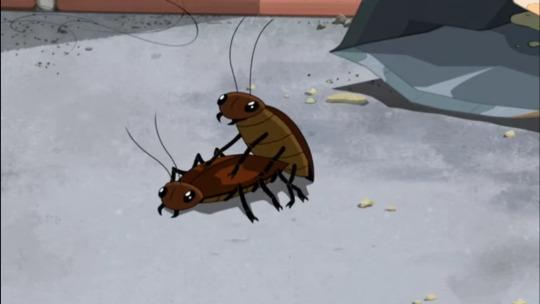
Cockroaches having sex...
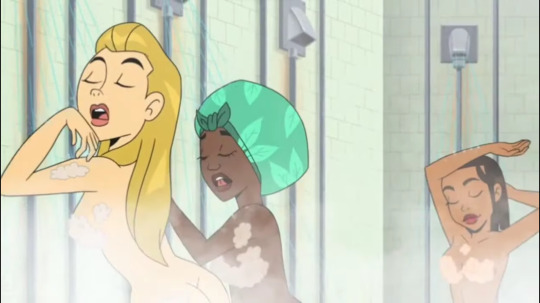
And fifteen year olds taking a shower to make a joke about how over-sexualized a series’ pilot can be.
First of all: FUCK YOU FOR MAKING ME FIND THIS SCREEN SHOT FOR A POINT!
Second: You lose every ounce of credibility that you actually care about people when one of the first moves you make in your series is to sexualize minors for the sake of a joke.
A joke that doesn’t make sense at that. Point me to a series pilot that’s over-sexualized. If you get more than ten, I’ll say you have a point. I won’t say that sexualizing minors to make it was a good thing, but I’ll at least say that, “Yeah. You’re right. So many pilots do this. SO STOP DOING IT!”
That’s the level of writing Velma has. And it’s why they have their “representation” to protect themselves. Meanwhile, you want to know the level of writing you’ll find in The Owl House and Amphibia?
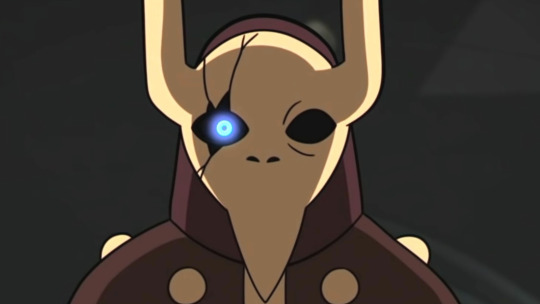
Villains who prove that the most dangerous people are the ones who make the rules.
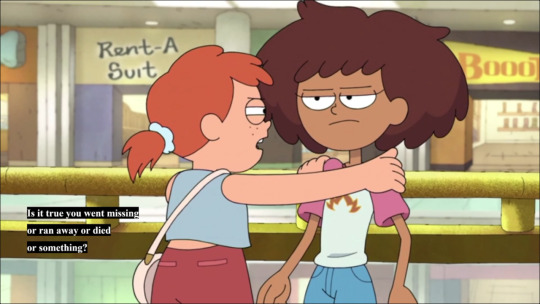
Jokes that are actually funny.
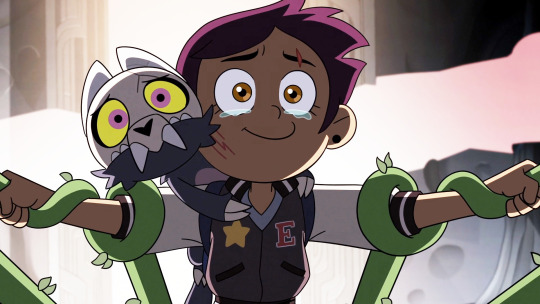
Likable main protagonists who are kind and caring to the people around them.
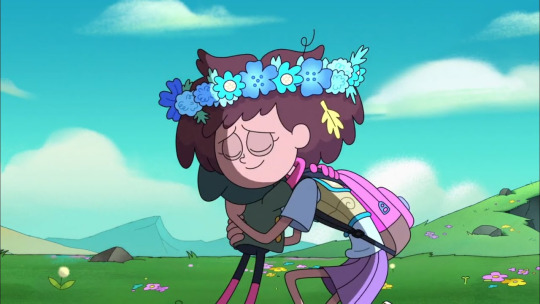
Protagonists who have heartfelt relationships with other great characters, to the point that it breaks your heart to see them leave each other.
And on top of that, actually good representation. But here’s the thing: The representation isn’t only genuine. It’s a bonus. Something great to add onto everything else the writers and the creators do right.
What it isn’t is an attempt to protect a show from what it does wrong.
And that’s it. That’s the LAST time I’ll ever talk about Velma. I really mean it this time.
Talking about this show past it’s premier is already more attention it deserves. And if you were smart, you would not only stop watching, but stop talking. The best attention to give something you hate is NO attention.
If you really want to waste time, waste it by watching something good, like The Owl House and Amphibia. They may be kids shows, but they have more maturity than a single second of Velma.
#velma series#velma series salt#the owl house#amphibia#luz noceda#anne boonchuy#cw: naked minors#cw: velma
573 notes
·
View notes
Text
Okay, this is a bit of a call-out post, which I don't like to engage in, but some of the stuff that's been brought to my attention, that's apparently been being said about me and, by extension, people who share my views, isn't really something I can let stand.
So apparently there's some blogs going around vague posting about Levi fans who dare (oh the horror) to call Levi a good man and a hero, saying stuff like doing so is how one treads down the path toward Nazism, because it's a "denial" of Levi's faults, and if we don't condemn his violence as outright bad or wrong, then we're liable to start making excuses for and justifying all forms of violence.
Do I even need to lay out why this argument is absurd and absolutely childish at its core? I don't think so, but I will anyway.
One of the overarching and main themes of AoT is that we shouldn't flatly condemn people for their actions without first understanding the context of those actions. That nothing is ever so simple as being flatly right or wrong, good or bad. That there can be and are complicating factors that might lead to any, given person's actions or behavior.
Levi himself is a prime example of this, and we see the error of flatly condemning and writing him off as "bad" in the form of Jean's and Mikasa's judgmental and dismissive attitude toward him after seeing him engage in acts of violence, only to themselves be forced into similar acts moments later.
The stupidity inherent to uniformly condemning all violence as bad or wrong lies in its total failure to consider any mitigating circumstances that might have lead to the violence in the first place, and, ironically, it's THAT sort of basic and simplistic thinking that leads toward the kind of fanatical, ideological foundations of Nazism and other, similar movements. Nuanced thought, consideration, empathy and critical thinking are never the things that lead down that road. Moralistic and generalized view points are what do that. To call Levi a "morally grey" character is to fundamentally misunderstand that morality itself is a "grey" concept. There's no such thing a black and white morality. Almost nothing is always right and always wrong, including violence. Very few things, if anything, can be definitely categorized as right and wrong in and of itself. The argument that some things need to be wholly condemned or eradicated is, for example, the same sort of logic that people who advocate for censorship apply. All pornography is bad or wrong? Better to just flatly condemn and ban all of it, then. Oh my, you're going to let two men marry each other? What if someone wants to marry an animal next? Better just make gay marriage illegal then, I guess. Many Jews are bankers, and banking is a corrupt business that preys on people's vulnerabilities, thus, all Jews are really just money launders and loan sharks and need to be stopped. Killing and violence is always wrong, and so people who kill or commit acts of violence are always criminals and bad people with malicious intent or who reveal in other people's pain. See how that works? All generalizations like that lead to is mass persecution, either of a concept or of a person/group of people, without taking into consideration the actual complexity or nuanced reasoning for why something or someone might be a certain way or do a certain thing. That's what's dangerous.
To deny Levi is a good man or a hero because he commits acts of violence is to totaly deny and strip him of all the many aspects and characteristics of his personality that makes him who he actually is. Levi's violence doesn't define him. It isn't who he is. Rather, it's a product of the world he lives in and the circumstances of his upbringing and life. It doesn't signify the person he is at his core. It doesn't negate the immense compassion, kindness, empathy and sensitivity with which he regards and treats other people. It doesn't render his heroism worthless or questionable. It doesn't undermine his intentions or motivations. It doesn't rob his many sacrifices of their selflessness. That's why I say Levi is a good man. Not because he's on the "good guy side" or because he holds a certain set of ideological beliefs, but because of those inherent qualities which define him as a good man. Compassion, kindness, empathy, emotional intelligence, and a genuine desire to help others for others sake. He's a good person because he actually, truly cares about other people. Is that assessment of him supposed to somehow lead down the road to fanaticism? How absurd.
That's not to say Levi doesn't have flaws. Of course he does. He's a human being, and all human's are flawed. Nobody ever said Levi was a "perfect" hero, just that he is a hero. Understanding Levi's violence and where it comes from and why he engages in it doesn't mean we're excusing it or calling it "good". It's simply an attempt to understand and acknowledge one of the main themes of AoT, which is that a person committing a "bad act" doesn't in and of itself make them a "bad person", and that certain actions and behaviors that are deemed "bad" by society can and often do have reasonable and justifiable explanations at their root. Does Levi resort to violence too often and too easily? Sure. I've said that and acknowledged it on multiple occasions. I've dedicated entire, long-winded analysis posts to exploring the duality of Levi's compassionate and empathetic nature with the fact that he's one of the most violent characters in AoT. His knee-jerk reaction and response to most situations is to apply physical force of one kind or another. Levi is also an extremely emotional character, and is given at times to bouts of emotionally excessive response. When he kicks Eren and Jean after his conversation with Erwin. When he manhandles Historia for her initial, flat refusal to take the throne. When he kicks Eren's teeth in during the RtS arc, or on the airship in Liberio. When he tortures Zeke in the cart on the way to the capital. These are all instances of Levi giving in to his emotion and responding violently. And no, it's not good, but it also doesn't make Levi bad. It doesn't make his intentions malicious or cruel in nature. In all of these instances of violence on Levi's part, it's driven by an intense emotional response, generally in regard to some traumatic event. Levi learning Erwin might not be the good man he thought he was. Levi having to torture a man for specific information, only to have the point of it threatened by Historia's self-pity. Eren interfering with Levi's direct command during a situation in which time was severely limited in making a decision. Eren slaughtering countless innocent people. Zeke forcing Levi to kill more than two dozen of his own soldiers. All of the examples one could point to of Levi being "unnecessarily" violent, meaning in a way that didn't further some larger goal or cause, were all moments of emotional reaction linked either to trauma or urgency or both. Most of these responses from Levi, in fact, came about because he was upset about someone else getting hurt, or at the possibility of people getting hurt. They're rooted, at their core, in Levi's compassion for others. They're emotional responses triggered by Levi's empathy and care. He gets angry because he's scared or grief stricken over someone else' suffering. And that's my and other fans' only point. Levi's violence might be considered bad by some, but the underlying reasons for it almost always prove Levi's goodness. He responds so strongly because he cares. So to refuse to acknowledge the circumstances and context surrounding those acts of violence and to refuse to acknowledge the influence of his upbringing in his inclination to respond with violence is grossly unjust and unfair to who Levi is as a person. To pretend that his very nature can't be contradictory to his actions and behavior is to deny, not just Levi's complexity as a person, but the complexity of people overall. Because Levi's nature is, much of the time, contradictory to his actions, especially when one only looks at his actions in a vacuum instead of in context. He's a violent man who also holds more kindness and compassion in his heart for people than any other character in the story. That's a contradiction. But it's true, nonetheless. You can be a good person who does bad things, or things deemed wrong by others and society.
Levi doesn't enjoy violence, and anyone who says he does or tries to claim he does is flatly wrong. To say, just because Levi is good at violence, that must mean he's somehow born to it, or that it's in his nature to want to commit it, is equally unjust and unfair in the way it dismisses the circumstances of his life and upbringing. A person can be forced into doing something that goes against their core temperament and personality due to forces outside of their control, and acknowledging that about Levi and his violence isn't the same as claiming him to be a "perfect hero". He's not perfect, but he is a hero. He's a hero because he's inherently selfless and kind and empathetic toward other people and their suffering, because he's willing to do all he can to help other people, despite an upbringing which forced violence and a familiarity with violence into his life, despite a childhood and young adulthood filled with deprivation and poverty. He wasn't born with a violent temperament, he was raised in an environment that necessitated a reliance on violence in order to survive, and so we see that manifest in Levi as an adult. A reliance on violence to survive. Again, to not acknowledge that and the impact it had on Levi's behavior and actions is unjust and unfair to him as a person. A stupid oversimplification of not just Levi as a character, but of people in general, and of the concept of justifiable violence too. Pacifism is an ideal, but one which doesn't and can't always coexist with reality. To judge someone and condemn then for engaging in violence, no matter the circumstances surrounding that violence, when nature itself is predicated on violence, is absurd.
Context matters. Circumstances matter. Intent matters. Levi's violence was never ideological in its reasoning. He never committed acts of violence in service to some abstract school of thought or philosophy. He never killed anyone because he thought they represented or symbolized some great evil or threat to the world and needed to be eradicated as a result. Levi's acts of violence have always been practical in nature. Defense of himself and others against people directly threatening their well being. And further, Levi has never, not once, tried to impose his way of thinking or doing on a single, other person. He's always, always, allowed everyone to decide for themselves. To come to their own conclusions of what they believe is right and wrong, good or bad. He's always allowed everyone their own agency. He's never manipulated or badgered or bullied anyone into agreeing with him or tried to brainwash anyone into a certain set of ideological beliefs. He's only ever wanted and tried to ensure people the freedom to make those decisions for themselves, and he's only ever tried to protect people, more often than not at great cost to himself.
He's the very definition of a hero, and to accuse people who call him that of exhibiting the kind of ideological thinking that leads to Nazism is not only absurd, but a massive insult, both to Levi's character and to the intelligence of his fans. As if they're incapable of understanding the nature of violence because they differentiate between acts of violence by applying critical thought to outside factors and mitigating circumstances. I guess our justice system is similarly incapable of understanding the nature of violence too, then, because it also dares to weigh outside factors and mitigating circumstances when judging a person's "crimes" or "guilt". It isn't the people who apply nuanced thought and consideration to Levi's actions who are susceptible to fanaticism, it's the people making those sorts of accusations who are, in exposing their total inability to divorce themselves from their black and white view of reality.
69 notes
·
View notes